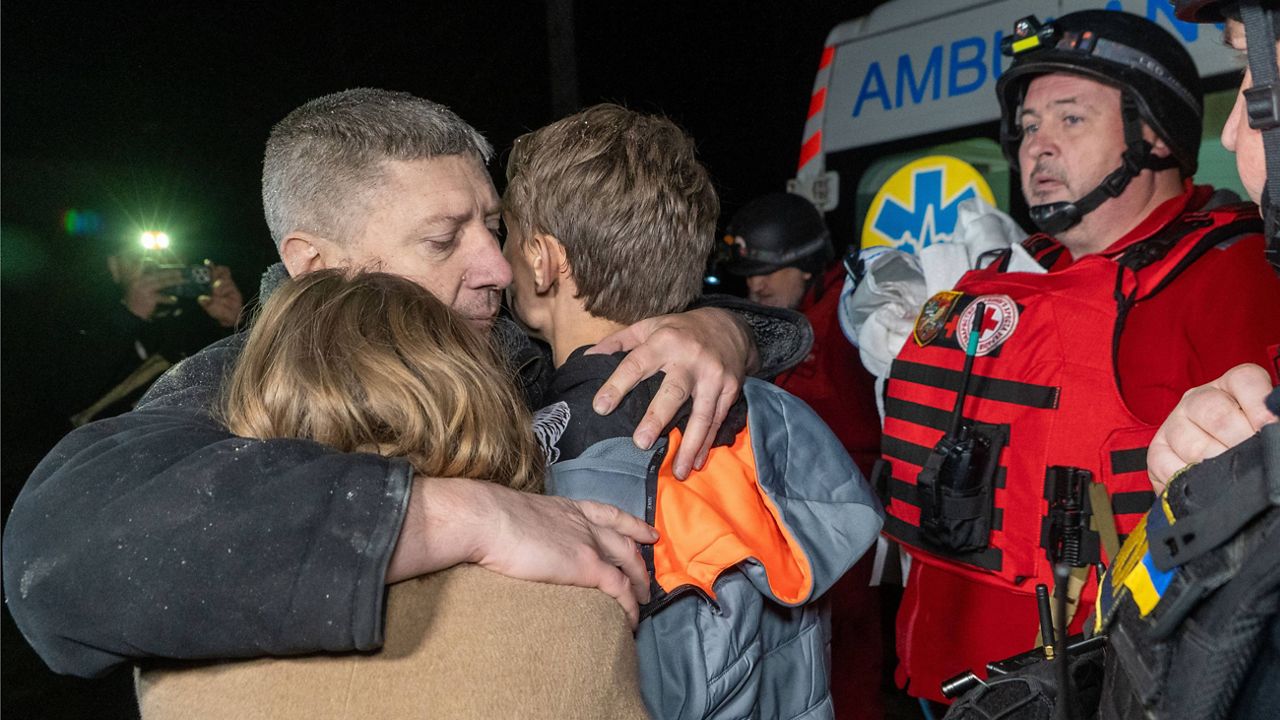WASHINGTON — Vice President JD Vance said on Sunday that the U.S. is “not at war with Iran” but that “we’re at war with Iran’s nuclear program” in the aftermath of a surprise attack overnight on three of that country’s nuclear sites.
“The Iranians are clearly not very good at war. Perhaps they should follow President Trump’s lead and give peace a chance,” Vance said on NBC News’ “Meet the Press” on Sunday morning. “If they’re serious about it, I guarantee you the president of the United States is too.”
Defense Secretary Pete Hegseth said Sunday at a Pentagon press conference that America “does not seek war” with Iran and “this mission was not and has not been about regime change.”
“I would just say, as the president has directed and made clear, this is most certainly not open-ended,” Hegseth said.
The mission, called “Operation Midnight Hammer,” involved decoys and deception, and met with no Iranian resistance, Hegseth and Air Force Gen. Dan Caine, chairman of the Joint Chiefs of Staff, said at the news conference.
Caine said the goal of the operation — destroying nuclear sites in Fordo, Natanz and Isfahan — had been achieved.
“Final battle damage will take some time, but initial battle damage assessments indicate that all three sites sustained extremely severe damage and destruction,” Caine said.
While U.S. officials urged for caution and stressed that only nuclear sites were targeted by Washington, Iran criticized the actions as a violation of its sovereignty and international law.
Iran’s foreign minister, Abbas Araghchi, said Sunday that Washington was “fully responsible” for whatever actions Tehran may take in response.
“They crossed a very big red line by attacking nuclear facilities,” he said at a news conference in Turkey. “I don’t know how much room is left for diplomacy.”
Secretary of State Marco Rubio said on CBS’s “Face the Nation” that “there are no planned military operations right now against Iran, unless, unless they mess around and they attack” U.S. interests.
Trump has previously threatened other countries, but often backed down or failed to follow through, given his promises to his coalition of voters not to entangle the United States in an extended war. It was not immediately clear whether Iran saw the avoidance of a wider conflict as in its best interests.
Much of the world is absorbing the consequences of the strikes and the risk that they could lead to more fighting across the Middle East after the U.S. inserted itself into the war between Israel and Iran. Airstrikes starting on June 12 by Israel that targeted Iran’s nuclear facilities and generals prompted retaliation from Iran, creating a series of events that contributed to the U.S. attack.
While U.S. officials urged for caution and stressed that only nuclear sites were targeted by Washington, Iran criticized the actions as a violation of its sovereignty and international law.
China and Russia, where Araghchi was heading for talks with President Vladimir Putin, condemned the U.S. military action. The attacks were “a gross violation of international law,” said Russia’s Foreign Ministry, which also advocated “returning the situation to a political and diplomatic course.” A Turkish Foreign Ministry statement warned about the risk of the conflict spreading to “a global level.”
British Prime Minister Keir Starmer said the United Kingdom was moving military equipment into the area to protect its interests, people and allies, but that he was focused on finding a solution. The leaders of Italy, Canada, Germany and France agreed on the need “a rapid resumption of negotiations.” France’s Emmanuel Macron held talks with the Saudi crown prince and sultan of Oman.
Iran could try to stop oil exports through the Strait of Hormuz, which could create the same kind of inflationary shocks that the world felt after Russia invaded Ukraine in 2022. Oil prices have increased in the financial markets as the war between Israel and Iran had intensified, climbing by 21% over the past month.
Vance said on NBC News that he is “very confident that we’ve substantially delayed their development of a nuclear weapon, and that was the goal of this attack.” The vice president said the U.S. had “negotiated aggressively’ with Iran to try to find a peaceful settlement and that Trump made his decision after assessing the Iranians were not acting “in good faith.”
He also noted that the U.S. government has been contacted indirectly by Iran in the hours since the attacks as President Donald Trump warned on social media last night that “ANY RETALIATION BY IRAN AGAINST THE UNITED STATES OF AMERICA WILL BE MET WITH FORCE FAR GREATER THAN WHAT WAS WITNESSED TONIGHT”
As the U.S. and the region await Iran’s response to the overnight strikes, Hegseth said that military generals have elevated force protection measures across the region, especially in Iraq, Syria, and the Persian Gulf.
“Our forces remain on high alert and are fully postured to respond to any Iranian retaliation or proxy attacks, which would be an incredibly poor choice,” Hegseth told reporters.
A Mideast-based maritime center overseen by the U.S. military warned Sunday that there’s a “high” risk to U.S.-associated ships after the American strikes on Iranian nuclear sites.
“The threat to U.S.-associated commercial shipping in the Red Sea and Gulf of Aden is currently assessed as HIGH,” the Joint Maritime Information Center, which is overseen by the U.S. Navy, wrote in an advisory to shippers.
“This categorization follows U.S. strikes on Iranian nuclear facilities and Houthi rhetoric directly targeting the U.S.-associated maritime assets,” it said. Yemen’s Houthi rebels on Saturday said they would attack U.S.-associated ships if America attacked Iran.
The Pentagon briefing did not provide any new details about Iran’s nuclear capabilities. Hegseth said the timeline was the result of a schedule set by President Donald Trump for talks with Iran about its nuclear ambitions.
“Iran found out” that when Trump “says 60 days that he seeks peace and negotiation, he means 60 days of peace and negotiation,” Hegseth said. “Otherwise, that nuclear program, that new nuclear capability will not exist. He meant it.”
That statement was complicated as the White House had suggested last Thursday that Trump could take as much as two weeks to determine whether to strike Iran or continue to pursue negotiations. But the U.S. benefited from Iran’s weakened air defenses as it was able to conduct the attacks without resistance from Iran.
“Iran’s fighters did not fly, and it appears that Iran’s surface to air missile systems did not see us throughout the mission,” Caine said.
Hegseth said that a choice to move a number of B-2 bombers from their base in Missouri earlier Saturday was meant to be a decoy to throw off Iranians. He added that the U.S. used other methods of deception as well, deploying fighters to protect the B-2 bombers that dropped 14 bunker-buster bombs on Iran’s site at Fordo.
The strikes occurred Saturday between 6:40 pm and 7:05 pm in Washington, or roughly 2:10 am on Sunday in Iran.


